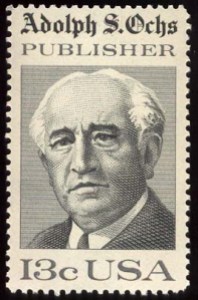
Previously published at WGBH News.
Last week I was asked a provocative question. What prompted it was a panel discussion of The New York Times’ 14,000-word exposé of how President Trump built his fortune on the dual foundations of his father’s wealth and of legally dubious tax schemes. The story was such a sensation that the Times printed it twice — once on Oct. 3 and again the following Sunday. Yet it seems to have barely resonated beyond the Times’ core readership.
Why, the panelists were asked, should we care? Thanks to the Trump effect, paid subscriptions are up at mainstream newspapers like the Times and The Washington Post, listenership has grown at NPR, and donations to nonprofit news organizations like ProPublica have increased. Wasn’t that good enough?
I responded that journalists want to do more than reach an audience. They want to have impact. They want to see concrete evidence that great reporting has an effect. That doesn’t mean journalists — good ones, anyway — want to change the outcome of elections or substitute their own judgment for that of the public. But it does mean that when they do important work, they want it to resonate beyond those already inclined to believe them without having it immediately dismissed as #fakenews by those on the other side of the social and cultural divide. Unfortunately, that’s exactly what happens in our current hyperpolarized environment.
I’m not sure what can be done. But New York University journalism professor Jay Rosen, one of our most perceptive media observers, thinks he knows what’s behind much of it: a deliberate blizzard of lying by our president aimed at burying stories beneath an avalanche of falsehoods; a right-wing populist movement in the United States and Europe that dismisses anything coming out of the mainstream press as corrupt and elitist; and the decline of trust in the media, accompanied and exacerbated by the ongoing deterioration of journalism’s business model.
The heart of Rosen’s argument is contained within a recent post at his blog, PressThink:
In the United States the President is leading a hate movement against journalism, and with his core supporters it is succeeding. They reject the product on principle. Their leading source of information about Trump is Trump, which means an authoritarian news system is for them up and running. Before journalists log on in the morning, one third of their potential public is gone. No one knows what to do about it.
Of course, Trump wouldn’t be able to wield this kind of power over the truth if he didn’t have enablers in the media, principally Fox News. But here we are some three and half years since he rode down the escalator and into the center of our political life, and too many journalists still don’t know how to cover him. Not that there are any obvious solutions. But surely the editors at USA Today knew better than to publish his falsehood-filled op-ed piece last week. And mainstream outlets too often engage in coverage that normalizes this most abnormal of presidents.
A large part of what needs to happen, Rosen says, is to acknowledge precisely what Trump is doing. I’m enough of a traditionalist that I have been more comfortable with describing Trump’s “falsehoods” rather than “lies,” mainly because we have no way of crawling inside his head to determine whether he knows the difference. Far too often, though, Trump traffics in false information that has been thoroughly debunked so many times that he has to know better. Through mid-September, he had spoken falsely more than 5,000 times as president. It’s clear that many of those falsehoods are deliberate, and that he lies for a reason. Rosen, in a Twitter thread, explained what Trump is doing:
Flooding the system with too much news, much of it misleading or simply false, not only reduces the weight of any individual story; it has the further effect of keeping opponents in a pop-eyed state of outrage, which in turns shows supporters a hateful image of the other side.
And that is why journalists care not just about reaching their own pre-determined audience but in changing hearts and minds. In decades past, reporters made a difference in how we thought about civil rights, the Vietnam War, and Watergate. Now nothing seems to matter. The Times’ tax story, Rosen wrote in his Twitter thread, “is proving to be simultaneously devastating and harmless, a news condition previously unknown to presidents facing a check-on-power press.” Trump is a historically unpopular president, yet he continues to exert a mesmerizing hold on his base — a base that has proved impervious to facts.
The Times and the Post, in particular, are doing a magnificent job of telling the story of the Trump era. Those two papers have never been more important than they are today. Yet in a fundamental way they have ceased to matter. Democracy dies in darkness. But it might also die in the clear light of day if not enough people care — no matter how much our audience has grown or how many subscriptions we’ve sold.
Talk about this post on Facebook.







